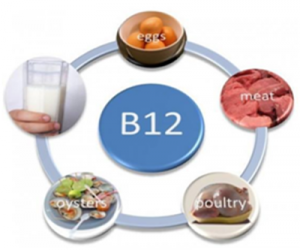
As a medical practitioner, I am appalled by the number of patients suffering from B12 deficiency. Patients complain about fatigue, vague pains, tingling, numbness, loss of concentration. Many tests are conducted with no results and the one missed is the test for vitamin B12. Vitamin B12 is the only vitamin that contains a trace element – cobalt – which gives this vitamin its chemical name – cobalamin – which is at the centre of its molecular structure.
B12 is required
- For the manufacture of red blood cells; deficiency leads to a characteristic kind of anemia
- To support the normal function of nerve cells, and to manufacture myelin, the insulating material that surrounds some of our nerve cells and speeds neural transmission. B12 deficiency impairs brain function. Advanced B12 deficiency causes dementia resembling Alzheimer’s.
- The deficiency leads to difficulty in regeneration of new healthy cells- mimics all of the effects of aging.
- B12 is involved in the metabolism of every cell of the human body, especially affecting DNA synthesis, fatty acid and amino acid metabolism.
Vitamin B12 is produced by some species of bacteria in colon. The colon is followed by the small intestine & is a part of large intestine and hence the B12 produced there is not absorbed which results in the need of supplementation.
Who should be concerned about B12 deficiency?
- If you are or were a vegetarians / a vegan – get yourself tested
- Babies born to mothers who are vegetarians
- Risk of B12 deficiency increases with age. So test yourself and fortify your meals
- Pernicious anaemia – is an autoimmune condition that affects your stomach. In your stomach, Vitamin B12 is combined with a protein called intrinsic factor. This mix of Vitamin B12 and intrinsic factor is then absorbed into the body in part of the gut called the distal ileum. Pernicious anaemia causes your immune system to attack the cells in your stomach that produce the intrinsic factor, which means your body is unable to absorb Vitamin B12.
- Conditions affecting your intestines – E.g. Crohn’s disease (a long-term condition that causes inflammation of the lining of the digestive system)
- Some types of medicine – E.g. proton pump inhibitors (PPIs) –a medication sometimes used to treat indigestion – can make a Vitamin B12 deficiency worse.
- People suffering from Atrophic Gastritis (the stomach line becomes thin)
- Surgery where a part of the stomach is removed, including weight loss surgery like bariatric surgery.
- Smoking, drinking & stress increases the requirement of B12
- Few autoimmune disorders
- Chronic illnesses leads to a deficiency of this diseases
Move towards a B12 rich diet if you have the following symptoms
- Weakness, tiredness, dizziness or lightheadedness
- Smooth tongue
- Palpitations and dyspnea
- Pale skin
- Constipation, diarrhea, a loss of appetite, or dyspepsia
- Nerve problems – numbness or tingling, muscle weakness,
- Loss of weight
- Mental problems – memory loss, or behavioral changes, confusions
- Glove & stocking neuropathy (tingling of palms & forearms, feet till knees) – in this scenario B12 deficiency is the majorly deficient apart from other nutrients

Sources of B12
Sources of B12 are animal products (meat, fish, and dairy products), fortified foods. Ensure sufficient quantities of these foods to maintain your B12 levels. If your count is low, consider oral or injectable forms of the vitamin. But why reach that stage?
Have the above mentioned foods in your routine. The best part of this Energy Nutrient is that the excess is excreted by the body or stored in the liver for use when supplies are scarce. Stores of B12 can last for up to a year. Unfortunately sometimes catching the B12 deficiency late can result in permanent damage. Any neurological damage due to B12 deficiency cannot be reversed. Ensure that your B12 levels are maintained at levels 200 to 900 picograms per milliliter (pg/mL).
#BeTheForce






